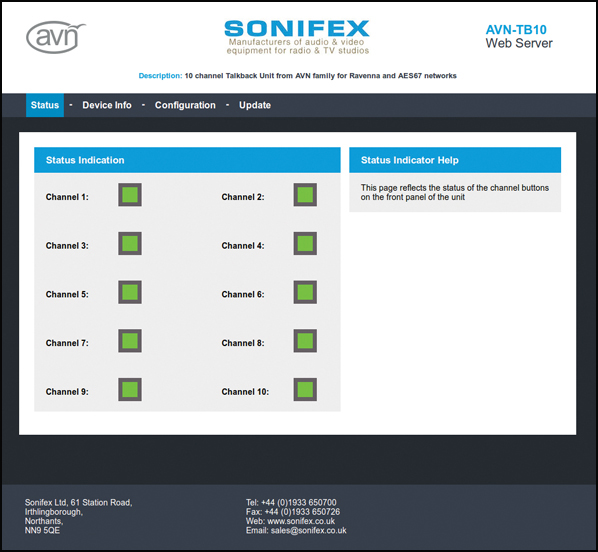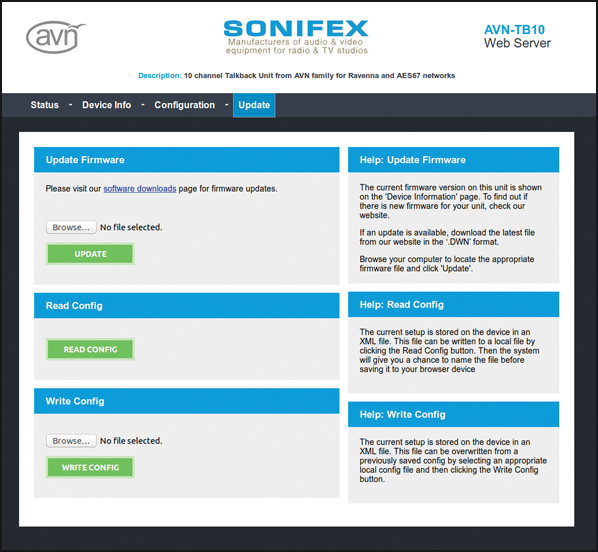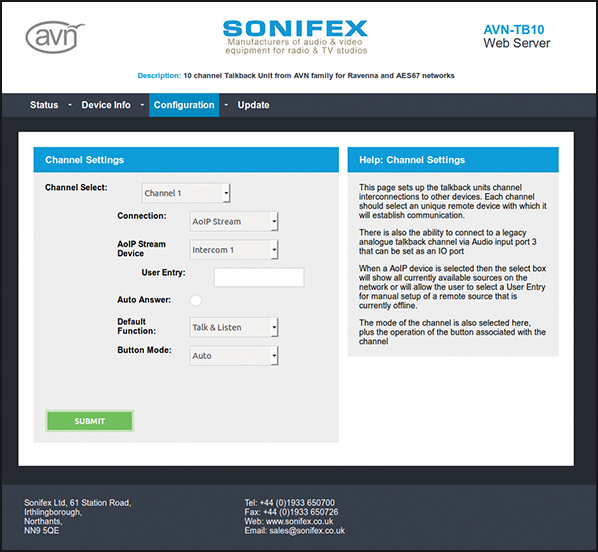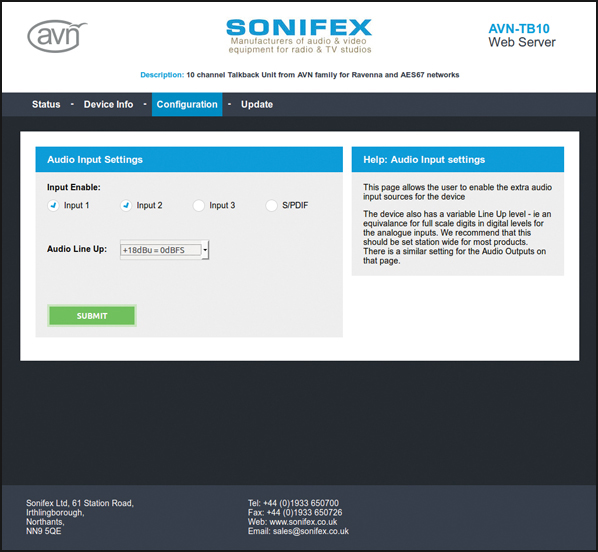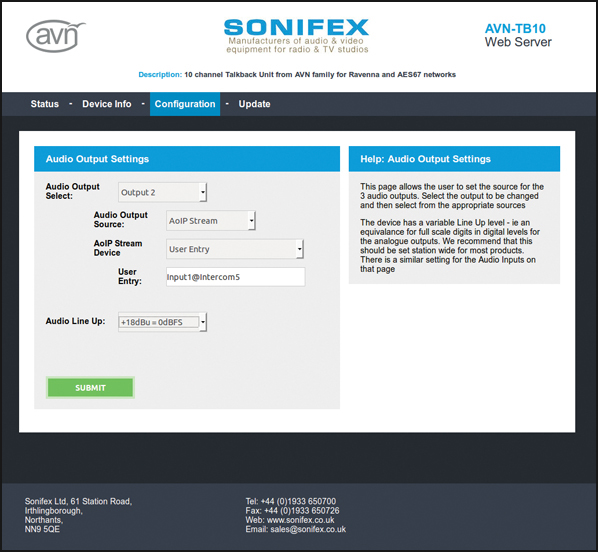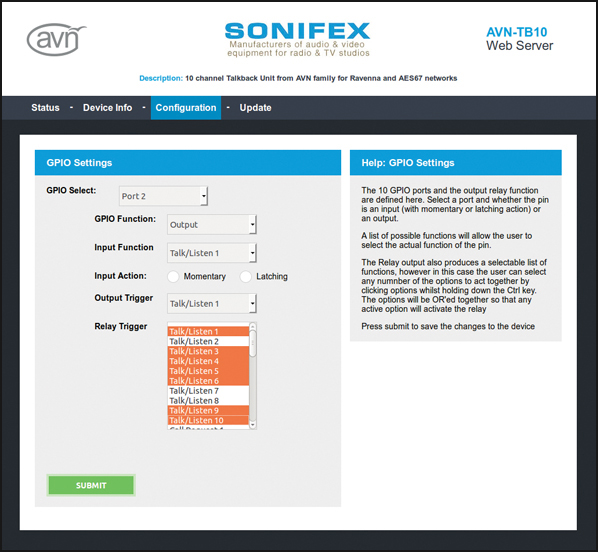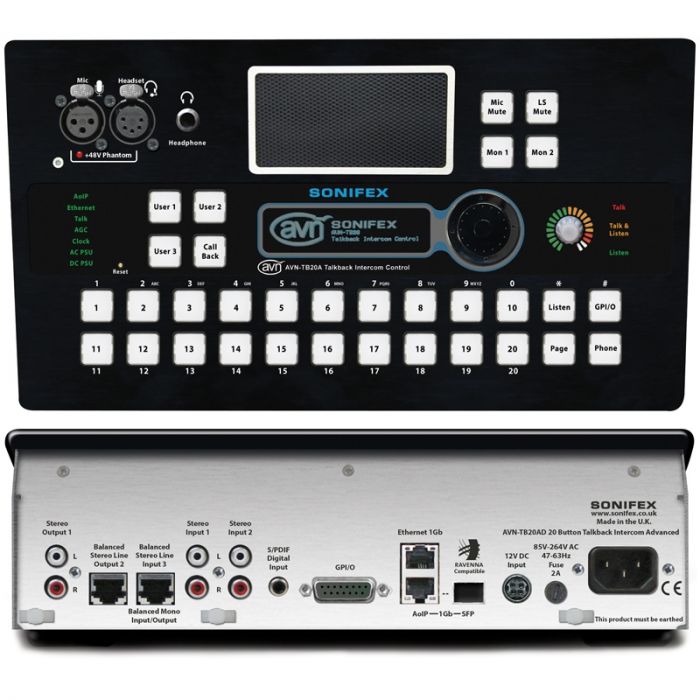Sonifex AVN-TB20AD 20 Button Advanced Talkback Intercom AoIP Desktop Portal

The AVN-TB20AD is a desktop version of the rackmount AVN-TB20AR intercom with a smaller form factor and an elegant sloped front. It has the same feature set and connectivity *.
* Except for an additional headset connector on the rear of the AVN-TB20AR.
Sonifex AVN-TB20AD 20 Button Advanced Talkback Intercom, AoIP Desktop Portal
AVN-TB20AD 20 Button Talkback Intercom Advanced, Desktop
Category: Audio Over IP Products.
Product Function: An advanced talkback/listening/paging intercom unit to enable voice/audio communication between different areas in a facility or building complex.
Typical Applications: OB truck comms, theatre comms, inter-studio comms in a TV or radio station.
Features
- 20 illuminated key-cap Talk buttons plus Listen & Page buttons.
- Phone button for remote dialling and control of an external telephone hybrid.
- Page button and Group Talk facilities.
- Callback button with callback source display.
- Three user definable buttons.
- Speaker & microphone mute buttons.
- Mic & headset inputs, headphone & speaker outputs.
- Front panel volume control which operates on speaker/headphone outputs and incoming source levels.
- +48V phantom power for the mic inputs.
- Ethernet webserver and front panel control & configuration.
- Front panel display providing source & destination information.
- Sources from AoIP, 1 x balanced, 2 x unbalanced or S/PDIF digital inputs.
- Destinations to AoIP or rear panel balanced & unbalanced outputs.
- Advanced echo cancellation & mic AGC to prevent acoustic feedback.
- Dual 1Gb lan ports & 1Gb SFP fibre port.
- 10 user assignable GPIO ports.
- GPIO button for triggering external events, via physical GPIO or network commands.
- Front panel LEDs for network audio presence, Talk activity, AGC activity, clock sync and power supply activity.
- Two front panel monitor buttons for routing audio directly to the speaker e.g. to take an IFB feed or off-air transmission signal.
- Ducking or mixing of inputs to speaker/headphones.
- Dual AC & DC power supply inputs.
SPECIFICATIONS
Audio-Over-IP Specification |
|
| Open Standards: | RAVENNA, AES67 |
| Device Discovery: | Bonjour (mDNS / DNS-SD) |
| Audio Delivery: | RTP/UDP over IPv4 multicast |
| QoS: | DiffServ |
| Stream Management: | RTSP/SDP |
| Control: | Ember+/webserver |
| Format: | Linear PCM 24-bit (L24) |
| Channels Per Stream: | 2 |
| Frames Per Packet: | 48 |
| Maximum Streams: | RX 25, TX 5 (fixed) |
| Sample Rate: | 48 kHz |
Timing Synchronisation |
|
| Profile Support: | Default, media & custom profiles |
| Timing Protocol: | PTPv2, IEEE1588-2008 |
Technical Specification |
|
Microphone and Headset Input |
|
| Input Impedance: | >2.5kΩ balanced |
| Gain Range: | 0dB to +60dB |
| 0dBFS Line-Up: | Adjustable in steps of 3dB from -58dBu to +2dBu |
| Frequency Response: | 20Hz to 20kHz, +0/-0.2dB |
| Noise: | -127dBu, 20kHz BW, Rs=200Ω ref. 76dB gain |
Unbalanced Line Inputs |
|
| Input Impedance: | >20kΩ |
| 0dBFS Line-Up: | +12dBu |
| Frequency Response: | 20Hz to 20kHz, +0/-0.2dB |
| THD+N: | <-97dBFS, -30dBFS, 20Hz to 20kHz, unity gain, 20kHz BW |
| Noise: | -100dBFS, 20kHz BW, Rs=200Ω |
| Crosstalk: | <-97dB |
Balanced Line Inputs |
|
| Input Impedance: | >20kΩ balanced |
| 0dBFS Line-Up: | Adjustable +15/+18/+20/+22/ +24dBu |
| Frequency Response: | 20Hz to 20kHz, +0/-0.2dB |
| THD+N: | <-110dBFS, -30dBFS, 20Hz to 20kHz, 20kHz BW |
| Noise: | -110dBFS, 20kHz BW, Rs=200Ω |
| Crosstalk: | <-100dB |
| Common Mode Rejection: | >70dB @ 1kHz |
Headphone Output |
|
| Output Impedance: | Drives 150mW into 32Ω to 600Ω headphones |
| 0dBFS Line-Up: | +20dBu |
| Frequency Response: | 20Hz to 20kHz, +0/-0.2dB |
| THD+N: | <-108dBFS, -30dBFS, 20Hz to 20kHz, unity gain, 20kHz BW |
| Noise: | -110dBFS, 20kHz BW |
Unbalanced Line Outputs |
|
| Output Impedance: | <50Ω |
| 0dBFS Line-Up: | +12dBu |
| Frequency Response: | 20Hz to 20kHz, +0/-0.2dB |
| THD+N: | <-95dBFS, -30dBFS, 20Hz to 20kHz, unity gain, 20kHz BW |
| Noise: | -100dBFS, 20kHz BW |
Balanced Line Outputs |
|
| Output Impedance: | <50Ω balanced |
| 0dBFS Line-Up: | Adjustable +15/+18/+20/+22/ +24dBu |
| Frequency Response: | 20Hz to 20kHz, +0/-0.2dB |
| THD+N: | <-110dBFS, -30dBFS, 20Hz to 20kHz, 20kHz BW |
| Noise: | -110dBFS, 20kHz BW, Rs=200Ω |
Loudspeaker |
|
| Power Output: | 4W |
| Volume: | Mute to full volume via front panel control |
Connections |
|
| Microphone: | XLR-3 pin female (electronically balanced) |
| Headphone: | ¼ inch (6.35mm) stereo jack socket |
| Headset: | 1 x XLR-5 pin female (front electronically balanced input) |
| Audio Inputs: | 2 x unbalanced stereo, RCA phono 1 x S/PDIF, RCA phono |
| Audio Outputs: | 1 x balanced stereo, RJ45 1 x unbalanced stereo, 2 x RCA phono 1 x loudspeaker output |
| Audio Input/Output: | 1 x balanced stereo input or mono input/output, RJ45 |
| GPIO: | 15-way ‘D’-type socket |
| Network: | 2 x gigabit Ethernet, RJ45 |
| 1 x SFP fibre | |
| Mains AC Input: | Universal filtered IEC, continuously rated 85-264VAC, 47-63Hz, 20W |
| DC Input: | 4 pin 7.5A power jack socket, 9.5-14VDC |
| Fuse Rating: | Anti-surge fuse 2A 20mm x 5mm |
Equipment Type |
|
| AVN-TB20AD: | 20 channel desktop talkback intercom control unit with RAVENNA AoIP |
Physical Specification |
|
| Dimensions: (Raw) | 29.4cm (W) x 16.5cm (D) x 8.5cm (H) 11.6” (W) x 6.5” (D) x 3.3” (H) |
| Dimensions (Boxed): | 40cm (W) x 28cm (D) x 15cm (H) 16” (W) x 11” (D) x 5.9” (H) |
| Weight: | Nett: 2.5kg Gross: 3.2kg Nett: 5.5lbs Gross: 7.0lbs |
Accessories |
|
| AVN-DC060: | 60W DC power supply for AVN range with KPJX-4S plug |
| CM-GM2: | Professional Gooseneck Condenser Microphone |
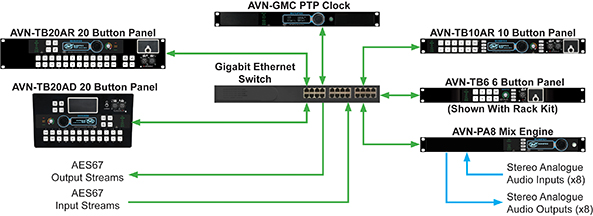
![]() Talkback Intercoms Using Audio Over IP, RAVENNA/AES 67
Talkback Intercoms Using Audio Over IP, RAVENNA/AES 67
Our new range of AVN (Audio/Video/Network) talkback/listening/paging intercoms aid communication between studios, stages, theatres, offices and different areas in a facility or building complex. They have both 4-wire and AoIP sources and destinations, and use RAVENNA/AES67 as the audio transport mechanism, allowing simple CAT 5 cabling and expansion.
Webserver Software
Each AVN-TB talkback unit has a built-in webserver for setup and configuration. The webserver is responsive, and resizes depending on the size of your screen, meaning that it can be used on large monitors or small handheld devices such as smart-phones. Help information is shown on the right hand side of the screen so it’s a good place to go to find out how the unit operates.
